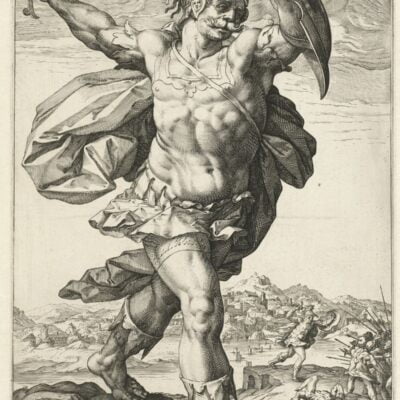After the expulsion of the Roman king Tarquinius Superb from Rome and the establishment of the Roman Republic, in 508 BCE, according to legend, the former king was to turn to the Etruscan ruler Porsenna of Clusium for help. He immediately decided to help the overthrown ruler and besiege Rome. By chance, a guard – Horatius Cocles had his guard on the bridge. Seeing the unexpected attack of the enemy on the hill of Janiculum, from which the Etruscans then descended towards the city, and the dispersed and terrified ranks of his own army rushing to flight, Horatius tried to stop them, calling for composure and explaining that leaving the bridge undefended meant letting the enemy into city gates. So he begged his companions to destroy the bridge while he intended to hold back the momentum of the attack as long as he could do it alone. Horatius ran to the front of the bridge, brushing aside those who were fleeing, taking the enemy ranks by surprise.
Two companions stood by his side: Spurius Lartius and Titus Arminius, both of noble birth and known for their bravery. Together, they managed to hold off the first attack of the enemy for some time. When only one span of the bridge remained, and those who were about to overthrow it called to the three soldiers to come down from the bridge, Horatius ordered his companions to do so while he himself remained in the Etruscan road. Then he began to challenge the enemy’s soldiers, accusing them of serving a tyrant who had deprived them of their freedom and now tries to deprive the Romans of it as well. The Etruscans stopped and looked at each other, wondering who should go into battle first. Finally, overcome with anger and shame, shouting loudly, they threw spears at Horatius. All javelins were stuck in the shield, so the Etruscans renewed their attack.
At that moment, amid shouts of joy from the Romans, the bridge collapsed, and the Etruscans stopped at the edge of the river. Then Horatius exclaimed: “Tiberinus, holy father, I pray thee to receive into thy propitious stream these arms and this thy warrior” and he threw himself fully armed into the river. Although the Etruscans continued to aim their javelins at him, he managed to swim to his own, thus performing a feat that posterity considered heroic and some considered impossible. The commander lost one eye in the battle, hence his nickname Cocles (“One-Eye”). The hero was rewarded with a monument and, according to tradition, the amount of land he ploughed in one day.
According to the traditional Roman version, Posrenna, after a long siege, was to withdraw from conquering the city, captivated by the acts of courage of its citizens: apart from Horatius, Mucius Scevola and Clelia showed heroism. Thanks to this legend, the figure of Horatius Cocles grew to the size of a hero who single-handedly stopped the Etruscan army from quickly capturing the capital.
The myth was preserved in the memory of posterity thanks to Roman historians: Livy and Polybius. Historians differ on only one point. According to Polybius, Horatius died in the waters of the river, while Livy claims that a Roman soldier swam to shore in full gear. Regardless of the further fate of the hero, he remained an important binder of Roman identity.







